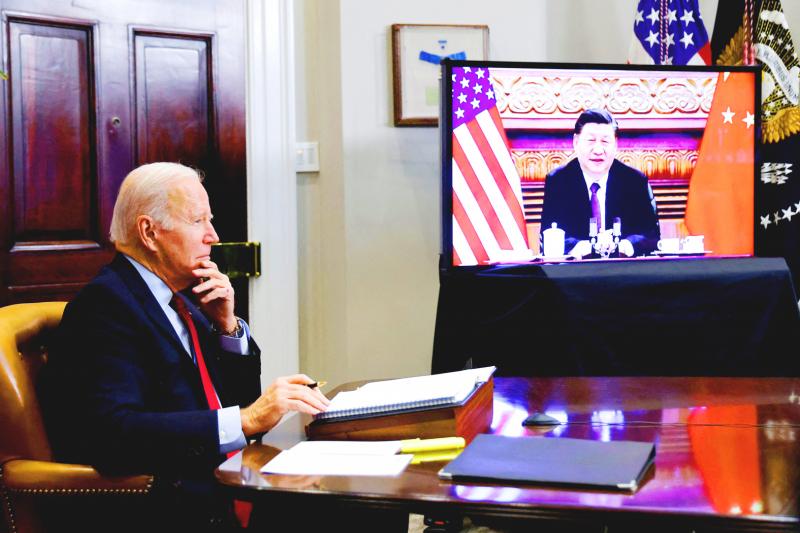A call between US President Joe Biden and Chinese Xi Jinping (習近平) scheduled to take place this week is likely to cover tensions over Taiwan, Pentagon spokesman John Kirby said on Tuesday.
“Everything from the tensions over Taiwan, to the war in Ukraine, as well as how we better manage competition between our two nations, certainly in the economic sphere,” Kirby told a news briefing.
Kirby’s comments come after Beijing expressed strong opposition to a reported trip to Taiwan by US House of Representatives Speaker Nancy Pelosi.

Photo: Reuters
Chinese Ministry of Foreign Affairs spokesman Zhao Lijian (趙立堅) on Tuesday last week called on Washington to “stop creating tensions over the Taiwan Strait.”
However, Kirby called the US-China relationship “one of the most consequential bilateral relationships in the world,” adding that there are possibilities for both sides to cooperate on issues such as global warming.
Kirby said the White House has seen some bellicosity from Beijing, but called the rhetoric “unnecessary,” adding that there has not been a formal announcement regarding Pelosi’s trip.
Kirby also declined to speculate if the reported trip would be on the agenda when Biden talks with Xi, only saying that Biden’s national security team had briefed Pelosi about security concerns and related arrangements.
The planned trip was first reported on Monday last week by the Financial Times, which cited six people familiar with the matter as saying that the 82-year-old Democratic lawmaker was planning to lead a delegation to Taiwan next month.
However, Biden on Wednesday last week said the US military thought that “it’s not a good idea right now ... but I don’t know what the status of it [the trip] is.”

NATIONAL SECURITY THREAT: An official said that Guan Guan’s comments had gone beyond the threshold of free speech, as she advocated for the destruction of the ROC China-born media influencer Guan Guan’s (關關) residency permit has been revoked for repeatedly posting pro-China content that threatens national security, the National Immigration Agency said yesterday. Guan Guan has said many controversial things in her videos posted to Douyin (抖音), including “the red flag will soon be painted all over Taiwan” and “Taiwan is an inseparable part of China,” while expressing hope for expedited “reunification.” The agency received multiple reports alleging that Guan Guan had advocated for armed reunification last year. After investigating, the agency last month issued a notice requiring her to appear and account for her actions. Guan Guan appeared as required,

Japan and the Philippines yesterday signed a defense pact that would allow the tax-free provision of ammunition, fuel, food and other necessities when their forces stage joint training to boost deterrence against China’s growing aggression in the region and to bolster their preparation for natural disasters. Japan has faced increasing political, trade and security tensions with China, which was angered by Japanese Prime Minister Sanae Takaichi’s remark that a Chinese attack on Taiwan would be a survival-threatening situation for Japan, triggering a military response. Japan and the Philippines have also had separate territorial conflicts with Beijing in the East and South China

A strong cold air mass is expected to arrive tonight, bringing a change in weather and a drop in temperature, the Central Weather Administration (CWA) said. The coldest time would be early on Thursday morning, with temperatures in some areas dipping as low as 8°C, it said. Daytime highs yesterday were 22°C to 24°C in northern and eastern Taiwan, and about 25°C to 28°C in the central and southern regions, it said. However, nighttime lows would dip to about 15°C to 16°C in central and northern Taiwan as well as the northeast, and 17°C to 19°C elsewhere, it said. Tropical Storm Nokaen, currently

PAPERS, PLEASE: The gang exploited the high value of the passports, selling them at inflated prices to Chinese buyers, who would treat them as ‘invisibility cloaks’ The Yilan District Court has handed four members of a syndicate prison terms ranging from one year and two months to two years and two months for their involvement in a scheme to purchase Taiwanese passports and resell them abroad at a massive markup. A Chinese human smuggling syndicate purchased Taiwanese passports through local criminal networks, exploiting the passports’ visa-free travel privileges to turn a profit of more than 20 times the original price, the court said. Such criminal organizations enable people to impersonate Taiwanese when entering and exiting Taiwan and other countries, undermining social order and the credibility of the nation’s